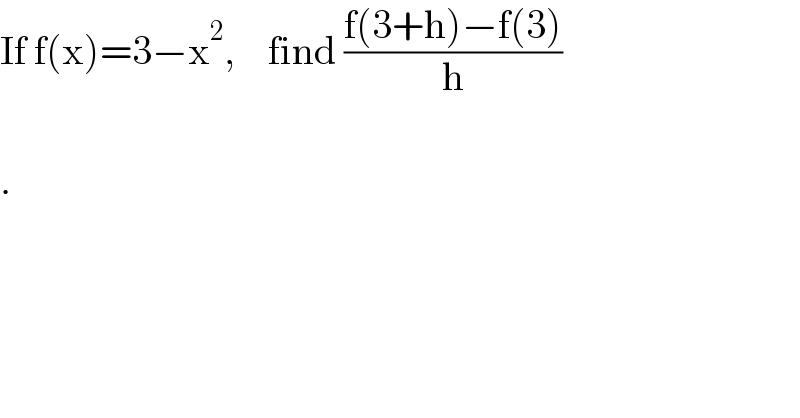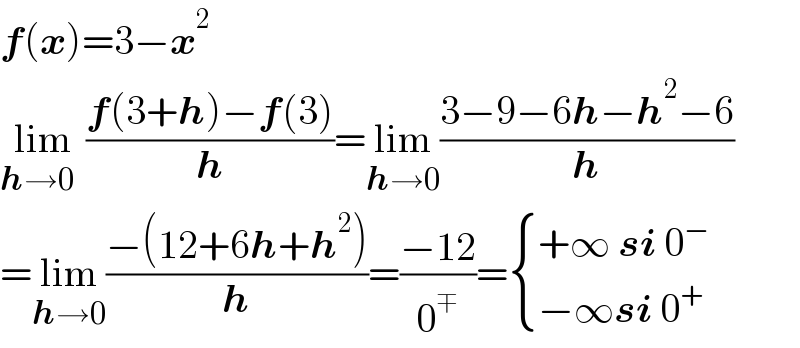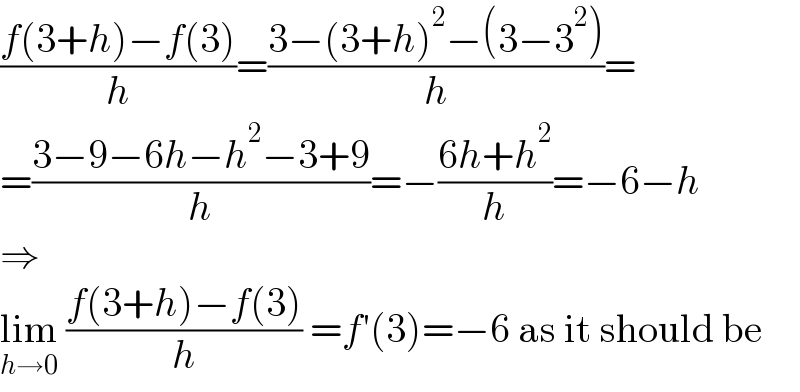
Question Number 181014 by Mastermind last updated on 20/Nov/22

$$\mathrm{If}\:\mathrm{f}\left(\mathrm{x}\right)=\mathrm{3}−\mathrm{x}^{\mathrm{2}} ,\:\:\:\:\mathrm{find}\:\frac{\mathrm{f}\left(\mathrm{3}+\mathrm{h}\right)−\mathrm{f}\left(\mathrm{3}\right)}{\mathrm{h}} \\ $$$$ \\ $$$$. \\ $$
Commented by CElcedricjunior last updated on 20/Nov/22

$$\boldsymbol{{f}}\left(\boldsymbol{{x}}\right)=\mathrm{3}−\boldsymbol{{x}}^{\mathrm{2}} \\ $$$$\underset{\boldsymbol{{h}}\rightarrow\mathrm{0}\:\:} {\mathrm{lim}}\frac{\boldsymbol{{f}}\left(\mathrm{3}+\boldsymbol{{h}}\right)−\boldsymbol{{f}}\left(\mathrm{3}\right)}{\boldsymbol{{h}}}=\underset{\boldsymbol{{h}}\rightarrow\mathrm{0}} {\mathrm{lim}}\frac{\mathrm{3}−\mathrm{9}−\mathrm{6}\boldsymbol{{h}}−\boldsymbol{{h}}^{\mathrm{2}} −\mathrm{6}}{\boldsymbol{{h}}} \\ $$$$=\underset{\boldsymbol{{h}}\rightarrow\mathrm{0}} {\mathrm{lim}}\frac{−\left(\mathrm{12}+\mathrm{6}\boldsymbol{{h}}+\boldsymbol{{h}}^{\mathrm{2}} \right)}{\boldsymbol{{h}}}=\frac{−\mathrm{12}}{\mathrm{0}^{\mp} }=\begin{cases}{+\infty\:\boldsymbol{{si}}\:\mathrm{0}^{−} }\\{−\infty\boldsymbol{{si}}\:\mathrm{0}^{+} }\end{cases} \\ $$
Commented by mr W last updated on 20/Nov/22

$${maybe}\:{you}\:{want}\:{to}\:{ask} \\ $$$$\mathrm{find}\:\underset{{h}\rightarrow\mathrm{0}} {\mathrm{lim}}\:\frac{\mathrm{f}\left(\mathrm{3}+\mathrm{h}\right)−\mathrm{f}\left(\mathrm{3}\right)}{\mathrm{h}}\:? \\ $$
Commented by Mastermind last updated on 20/Nov/22

$$\mathrm{i}\:\mathrm{think}\:\mathrm{it}\:\mathrm{should}\:\mathrm{be}\:\mathrm{like}\:\mathrm{that} \\ $$
Commented by mr W last updated on 20/Nov/22

$${this}\:{is}\:{your}\:{question}.\:{you}\:{should}\:{know} \\ $$$${what}\:{you}\:{want}\:{to}\:{ask},\:{or}\:{not}? \\ $$
Commented by Frix last updated on 20/Nov/22

$$\frac{{f}\left(\mathrm{3}+{h}\right)−{f}\left(\mathrm{3}\right)}{{h}}=\frac{\mathrm{3}−\left(\mathrm{3}+{h}\right)^{\mathrm{2}} −\left(\mathrm{3}−\mathrm{3}^{\mathrm{2}} \right)}{{h}}= \\ $$$$=\frac{\mathrm{3}−\mathrm{9}−\mathrm{6}{h}−{h}^{\mathrm{2}} −\mathrm{3}+\mathrm{9}}{{h}}=−\frac{\mathrm{6}{h}+{h}^{\mathrm{2}} }{{h}}=−\mathrm{6}−{h} \\ $$$$\Rightarrow \\ $$$$\underset{{h}\rightarrow\mathrm{0}} {\mathrm{lim}}\:\frac{{f}\left(\mathrm{3}+{h}\right)−{f}\left(\mathrm{3}\right)}{{h}}\:={f}'\left(\mathrm{3}\right)=−\mathrm{6}\:\mathrm{as}\:\mathrm{it}\:\mathrm{should}\:\mathrm{be} \\ $$
